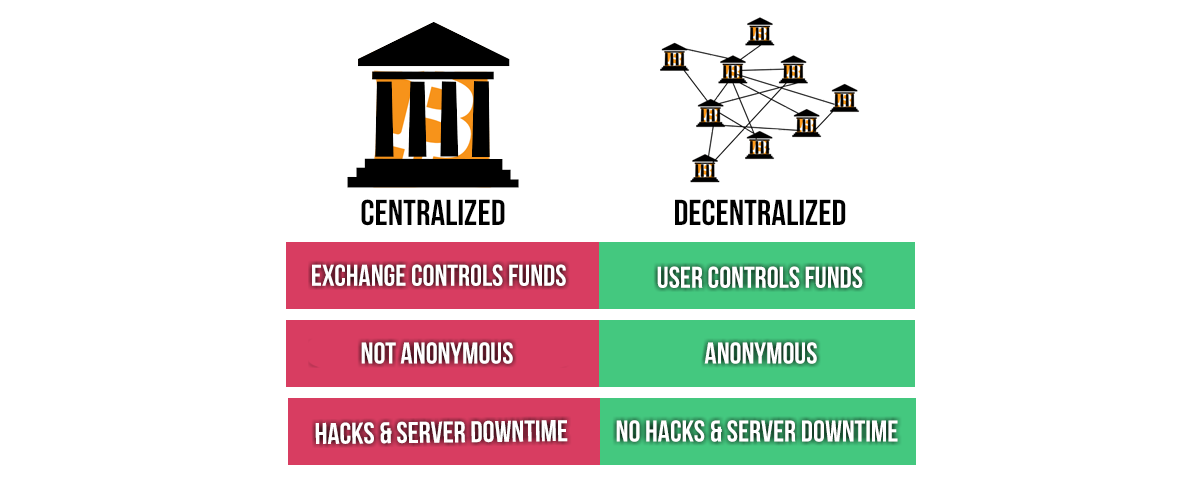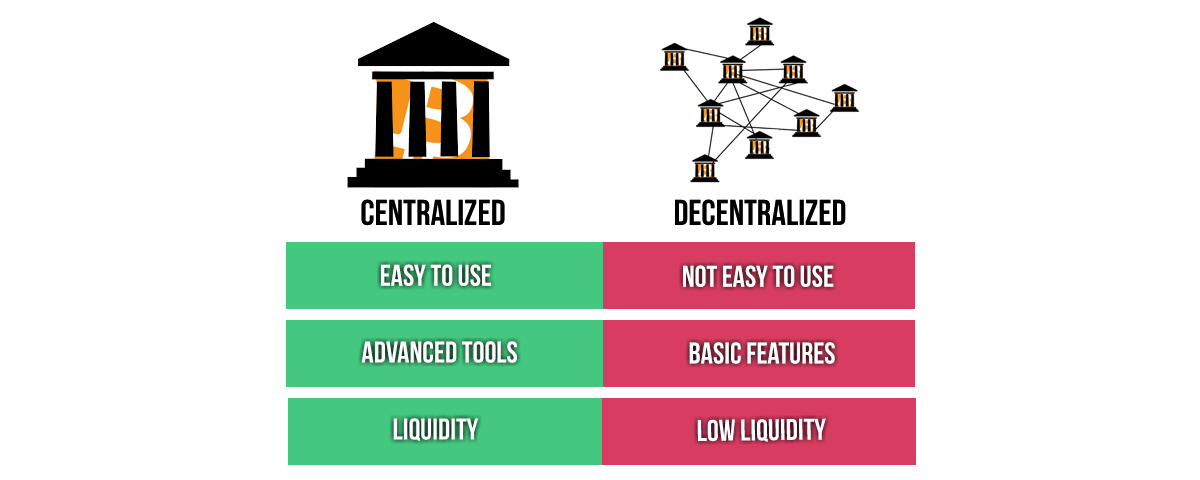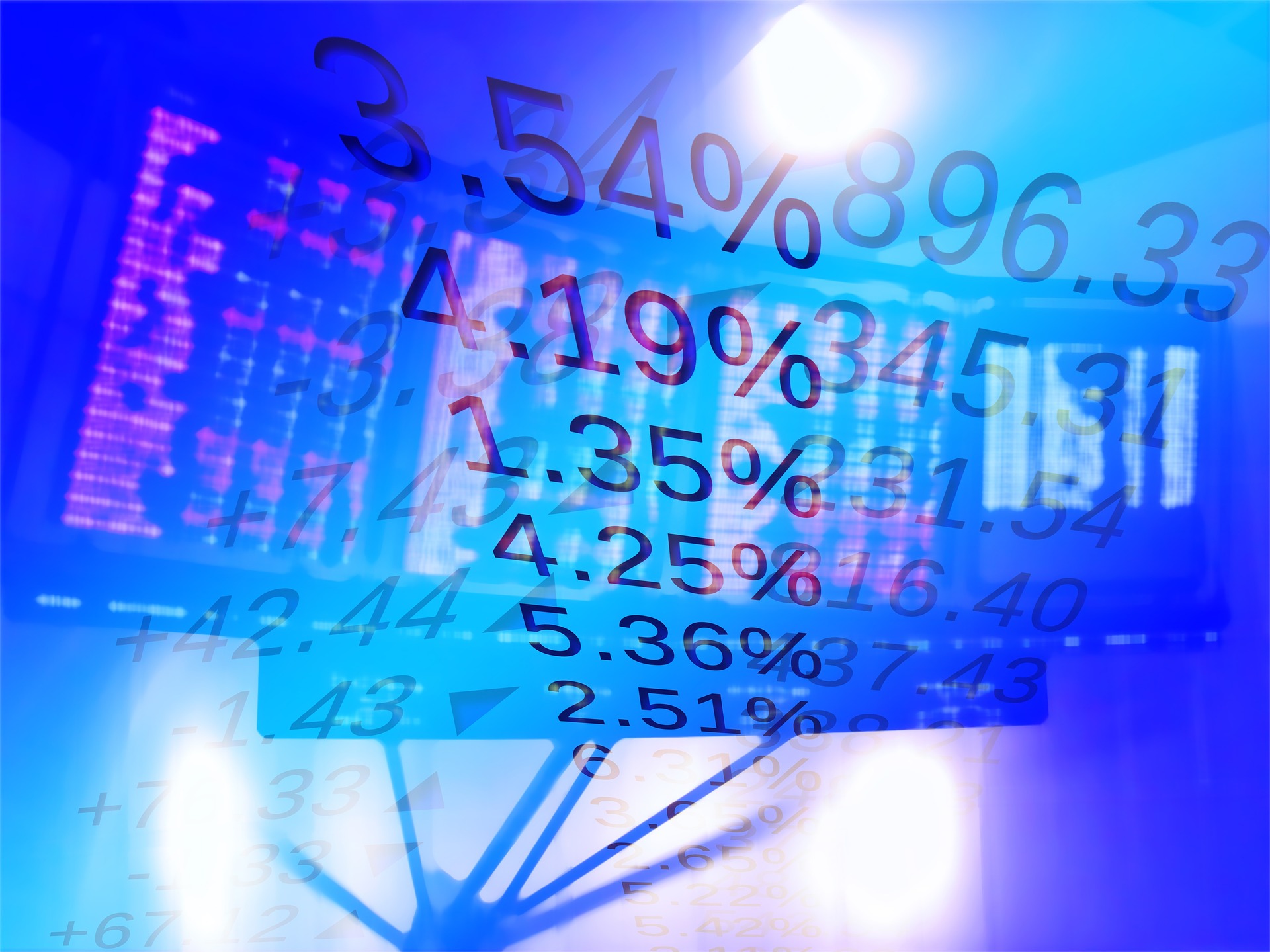Decentralize everything: this is the blockchain utopia. Almost all cryptocurrencies are decentralized and are secured by its network. However, when buying your first cryptos, you have almost certainly used a centralized exchange. This is rather counterintuitive given that blockchain technology enables the decentralizazion of everything that is or can be digitally stored.
Centralized Exchanges
Some major centralized exchanges are:
- Binance
- Coinbase
- Bitfinex
- Bittrex
- Kraken
- Poloniex
- Bithumb
Click here for a full list.
Currently, nearly all crypto trades are conducted through centralized exchanges. These exchanges basically provide a platform on which buyers and sellers of cryptocurrencies can trade with each other. Some exchanges also provide additional financial services such as advanced trading and margin lending.
Most of the exchanges are easy to use, once you have given them enough personal information. They require this information to comply with anti-money laundering laws of the country they operate in. All the personal information of their users has to be stored securely by one central party, the exchange.
Some, but definitely not all exchanges, also provide a gateway for fiat currencies such as Dollars, Euros and Yuans. They allow you to deposit your fiat currency and trade these for cryptocurrencies. Currently, centralized exchanges are still necessary for trading fiat currencies as it takes a lot of compliance with regulations to be allowed to deal with large sums of fiat.
It’s very important to understand that once you’ve bought your cryptocurrencies, you don’t directly own them. They are added to your exchange wallet, but the cryptos are still owned by the exchange. The exchange is control of your cryptos and your wallet keys. Only when you withdraw your cryptos and send them to your personal wallet are you in full control of your purchased cryptocurrencies.
The Looming Threat of Hacks and Governments
You probably already see the problem: a central organization with such large amounts of currencies and data attracts a lot of criminal attention. Even though the central exchanges have made security their top priority, it remains a continuous and increasingly sophisticated threat. The past has shown us that hacks of exchanges do happen, and can have a massive negative impact on the crypto space.
The Mt. Gox hack is the best example of this. In 2011, $460 million was stolen by hackers from Mt. Gox, the biggest exchange at that time. This hack caused a depressed market for years. It wasn’t the first or the last hack, and this danger is always present for centralized exchanges.
Besides hacks, governments pose a substantial threat to centralized exchanges and their users. We’ve seen the China crackdown during which the Chinese government forced Chinese exchanges to terminate their operations.
Moreover, exchanges such as Kraken and Bitfinex had to stop dealing with US citizens in order to comply with regulations. Because centralized exchanges are situated in a single country, they are at the mercy of the government of the country they are operating in.
Decentralizing Exchanges
Both of these major security concerns with centralized exchanges are not an issue for decentralized exchanges. Following the logic of blockchain, these exchanges are secured and verified by the network of the exchange, making them secure and globally dispersed.
Here’s a list of decentralized exchanges:
- Waves
- Lykke
- Etherdelta
- Bitshares
- Cobinhood
- 0X
- Nxt
- Counterparty
- Kyber network
- Airswap
- Ethos (previously known as Bitquence)
Because of its very nature, decentralized exchanges are inherently “trustless”. There is no central organization which we, as users, have to trust to secure our funds and data.
Instead, all trades on decentralized exchanges occur on a peer-to-peer basis, directly between users. For example, if you want to sell your bitcoin for ethereum, you would place a sell order on the exchange and wait until someone wants to buy bitcoin with his ethereum for the price you decided on. Once the trade is agreed upon, both bitcoin and ethereum are transferred directly to the personal wallets of both users.
In terms of data, no personal information is required for using decentralized exchanges. For almost all cryptocurrency wallets, you simply download the wallet or application, create a new (anonymous) account, and there you go.
Decentralized exchanges are run by its network. This means that the servers can’t be overheated as the entire network functions as the server. A decentralized exchange can only experience downtime or become inaccessible if all the nodes of its network fail simultaneously.
Moreover, there is no central server to be hacked. The only component of decentralized exchanges that can be hacked are the individual users. Always secure your cryptos and you store your passwords and backup phrases physically.

Disadvantages of Decentralized Exchanges
There are, however, some downsides to using decentralized exchanges.
Firstly, they are complex to use. Etherdelta, a popular decentralized exchange for Ethereum-based cryptocurrencies, has received a lot of complaints for not being user-friendly. When observing coins tradable on Etherdelta alone, you can see a lot of major price spikes caused by users entering incorrect buy orders, and losing a lot of money because of it.
Secondly, the more advanced trading options and margin lending aren’t available yet on decentralized exchanges. On most, you can only buy and sell cryptocurrencies.
Finally, due to the fact that not a lot of people are using these exchanges yet, they have relatively low liquidity. This means that there are low quantities of currencies available on the exchanges, making them susceptible to price manipulation by larger investors. Moreover, low liquidity can also lead to prices that differ quite a lot from exchanges with high liquidity.

Last Thoughts
The rapid growth of the number of decentralized exchanges and the number of users of these exchanges indicate the rising popularity.
The upsides of decentralized exchanges vastly outweigh its downsides and they have a clear competitive advantage over centralized exchanges:
- Your funds and data aren’t secured by a central organization, but secured by blockchain technology, thus the network.
- You are in control and there are no trust issues.
If decentralized exchanges find a way to increase liquidity, offer more services and create a user-friendly platform, the centralized exchanges might rapidly become a part of crypto history.
Related: Cryptocurrency Transaction Fees: A Beginner’s Guide

